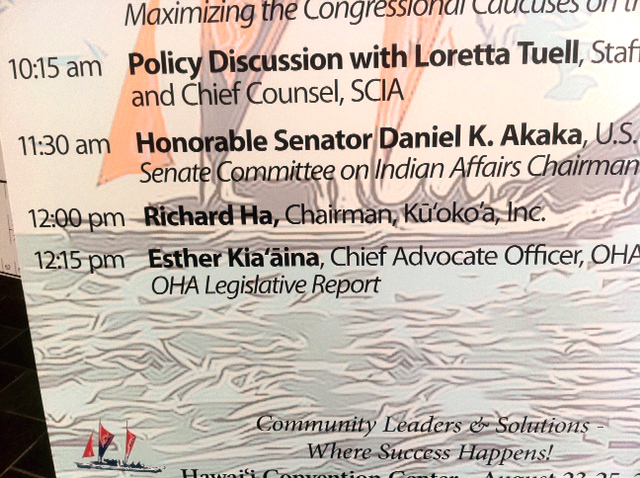Noe Kalipi, Ramsay Taum and I – all board members from Ku‘oko‘a – each spoke for five minutes at the Council of Native Hawaiian Advancement conference.
Noe and Ramsay were just awesome. It’s clear that Ku‘oko‘a is a native Hawaiian company with native Hawaiian sensibilities. The good wishes and warm requests for information were very humbling.
Senator Akaka spoke right before us.
Here is the speech I gave.
Aloha Everyone,
I am Richard Ha, chairman of the board of Ku‘oko‘a. Ku‘oko‘a is trying to align the needs of the people with the needs of the utility.
I want to start by telling you who I am and what my values are. Mom is Okinawan, Higa from Moloka‘i; Pop’s father was Korean, Ha. My pop’s mom was Leihulu Kamahele. And her mom was Meleana Kamoe Kamahele and her dad was Frank Kamahele. Our family land was down the beach at Maku‘u in Puna. We were very poor but didn’t know it.
Pop would tell stories at the dinner table. He would talk about impossible situations, impossible odds. Then he would pound the table and point in the air. “Not, no can. CAN!”
And he would say, “There are a thousand reasons why no can. I only looking for the one reason why ‘Can.’”
He told us to find three solutions for every problem, and then find one more just in case. He only finished sixth grade, but he was a wise man.
I was a kolohe kid growing up. I went to UH Manoa, where I flunked out. Too many places to go, people to see and beers to drink. I was drafted, and applied to go to Officers Candidate School, and then I volunteered to go to Vietnam. Ended up walking in the jungle with a hundred other soldiers. If we got into trouble there was no one close enough to help us. The unwritten rule was that we all come back, or no one comes back. I liked that and kept that attitude ever since.
I went back to UH and majored in accounting so I could keep score when I went into business. Pop asked if I would come back and help run the family chicken farm. I came back and saw an opportunity to grow bananas, but I had no money.
“Not, no can, CAN!” so we traded chicken manure for banana pulapula. By questioning everything, looking into the future and forcing change we have been able to survive in farming for more than 30 years.
We farm 600 fee simple acres with 60 workers. Five years ago, we noticed supply costs had been steadily rising, and we found it was all due to oil. I was the only person from Hawai‘i to attend three Peak Oil conferences. I went to learn about oil so that we could position our business.
There I found out that the world had been using twice as much oil as it had been finding for the last 30 years. This is a very serious situation. I am stuck with this knowledge and that knowledge has become my kuleana. I know what is likely to happen and so try to find solutions that are good for all of us.
There are truly Native Hawaiian sensitivities embedded in our Ku‘oko‘a team and organization. The board and the team we have put together are the best we could find. Ramsay Taum and Noe Kalipi are members of our board and we will each say a few words. Board members went to Hilo to participate in the festivities for the seven vaka that came up from the south. We felt that it was important.
Right now there are no guidelines to choose the low-cost, proven technology solution that eases the pressure on the rubbah slippah folks. We can do this. You folks all know the consequence of rising cost of energy, water, school lunches, etc. It is the folks on the lowest rungs of the economic ladder who will get their lights turned off first. Too often they are Hawaiians.
Iceland has managed to make themselves energy secure and food secure. Their electricity costs are less than half of ours. Can we find the solution to our energy problems while taking care of the rubbah slippah folks too? Leaving them behind is not an option. If we search for the solution, if we ask the question, we can find the answer.
In modern Hawaiian history, the economy has taken taken taken and the culture has given, given, given. We have a unique opportunity now where the economy can give and the culture can receive. If we can stabilize energy costs at a low level, as oil prices rise we will become more competitive to the rest of the world and our people’s standard of living will rise. We can address the energy problem and take care of the rubbah slippah folks too.
As Pop used to say: “Not ‘no can;’ ‘CAN!’”


